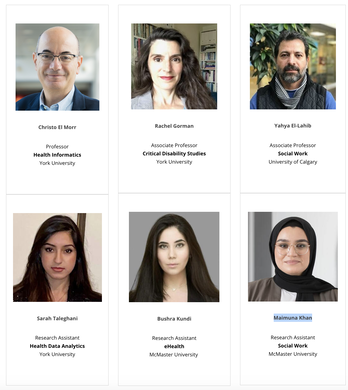Towards an Accessible and Inclusive AI (AI2)

TEAM
Canada: Christo El Morr (PI), Rachel Gorman (Co-PI), Yahya El-LAhib (co-PI)
Research Assistants: Sabine Fernandes, Sarah Taleghani, Bushra Kundi, Maimuna Khan.
Project (project website)
Artificial intelligence (AI) is a field of study that allows computers to mimic human intelligence and is part of health informatics.
Machine learning techniques are a subset of AI techniques that detect patterns in the data to assist users in making decisions. However, AI can also perpetuate biases against certain groups, including people with disabilities.
This is because AI software learns from pre-existing data and uses that data to make predictions. AI bias has been reported in many areas, including business, social media, the economy, politics and healthcare.
While researchers started to account for the types of biases built in AI-based software, an assessment of AI biases towards people with disabilities is virtually nonexistent. We must ensure that AI models are built accessibly and inclusively for people with disabilities and other groups.
This project assesses AI use for people with disabilities, its current advantages and challenges. The outcomes will support future research agendas, practices and policies.
Publications
In progress.
Canada: Christo El Morr (PI), Rachel Gorman (Co-PI), Yahya El-LAhib (co-PI)
Research Assistants: Sabine Fernandes, Sarah Taleghani, Bushra Kundi, Maimuna Khan.
Project (project website)
Artificial intelligence (AI) is a field of study that allows computers to mimic human intelligence and is part of health informatics.
Machine learning techniques are a subset of AI techniques that detect patterns in the data to assist users in making decisions. However, AI can also perpetuate biases against certain groups, including people with disabilities.
This is because AI software learns from pre-existing data and uses that data to make predictions. AI bias has been reported in many areas, including business, social media, the economy, politics and healthcare.
While researchers started to account for the types of biases built in AI-based software, an assessment of AI biases towards people with disabilities is virtually nonexistent. We must ensure that AI models are built accessibly and inclusively for people with disabilities and other groups.
This project assesses AI use for people with disabilities, its current advantages and challenges. The outcomes will support future research agendas, practices and policies.
Publications
In progress.
